Car Makes a Screeching Noise When Turning on
One way to tell that a mechanical system requires repair is when you hear sounds. And this is especially true when a car squeaks when turning left or squeaks when turning right. More than likely, the squeaking noise is trying to tell you that something with your drivetrain needs attention. Your car's drivetrain is any part that works to move or steer your car – except the engine.
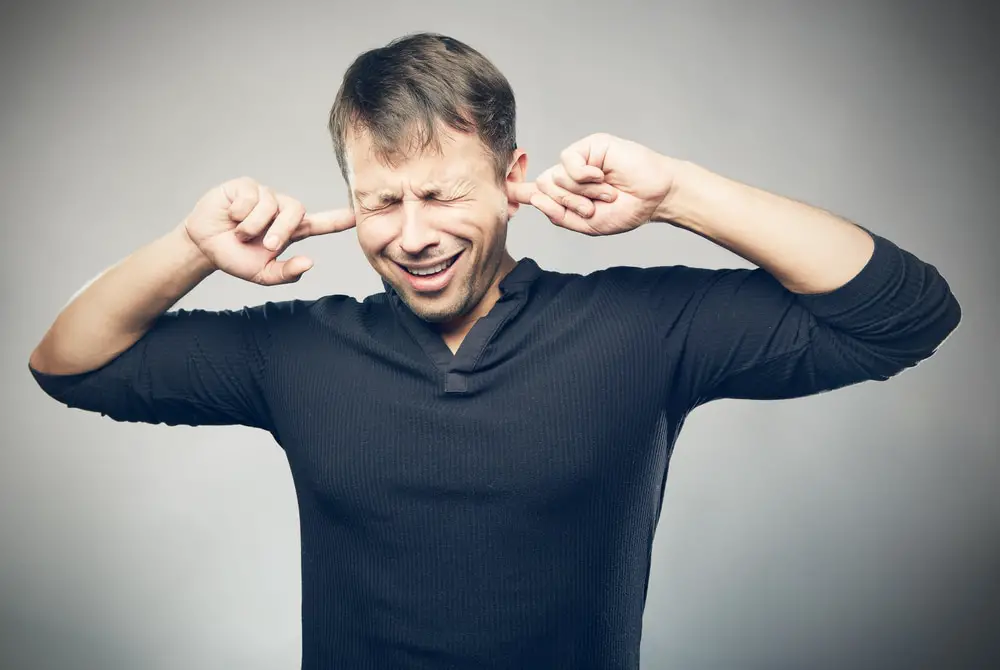
If your car squeaks when driving, it could be due to drivetrain parts:
- Axle shaft
- U-joints
- CV joints
- Driveshaft
If your car squeaks when turning, it could also be part of the chassis.
- Suspension system
- Shocks or struts
If you hear an unpleasant squeaking sound while driving, it could be a dangerous condition.
8 Causes of your car squealing when turning
Skip to the good stuff:
- 8 Causes of your car squealing when turning
- 1. Power Steering System
- 2. A Bad CV Joint
- 3. Steering Wheel Friction
- 4. Worn Steering Wheel
- 5. Steering Column Problems
- 6. Suspension and Chassis Noises
- 7. Loose Interior and Exterior Trim
- 8. Bad Ball Joints
- How Dangerous is a Squeak When Turning?
If you're a visual learner, check out this video from Gerard Burke fixing a noise when turning and braking.
1. Power Steering System
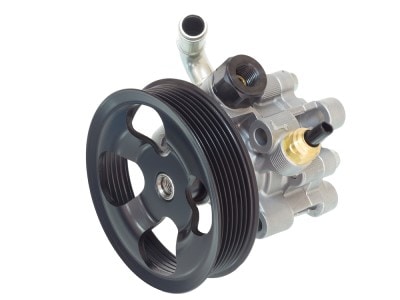
A car with low power steering fluid can cause a squealing noise. Check your fluids, especially if you've noticed the steering wheel has become hard to turn. If this noise is loud, it could signify your power steering system is going bad. If power steering fluid is leaking from the power steering rack, replacing the liquid will only be a temporary solution.
When the power steering fluid is not low, only an automotive service center can determine if the power steering rack is the problem.
2. A Bad CV Joint
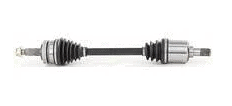
If you have squeaking noise when turning at low speeds, it could be your CV joint needs replacing. CV joints have a protective boot that is grease-filled and sealed. If it becomes damaged or cracked, the CV joint can run dry. This makes turning the steering wheel result in a clicking, crunching, or squealing noise. The CV joint helps the drivetrain send power from the transmission to the driveshaft and to the wheels.
When the severity of this noise gets louder while turning corners (a clicking or popping noise), driving can be dangerous. The CV joint may disintegrate and leave you stranded on the road. The most common fix is a CV joint replacement, which is a common repair for cars with over 300,000 miles.
Read about the cost to repair a CV joint
3. Steering Wheel Friction
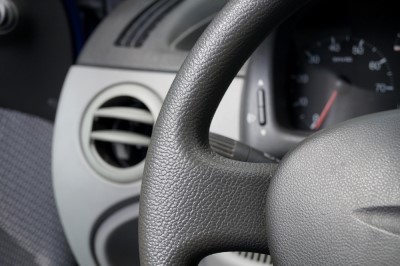
Sometimes manufacturing problems can be the cause of a car that squeaks when turning. Especially if the noise is coming from inside the cabin or from underneath the dashboard. In new vehicles, the plastic material can rub against interior trims. These noises are usually not related to a steering problem. Budget car models may develop a squealing or squeaking noise from the steering wheel when fasteners become loose.
The most common fix for a squeaking steering wheel is to return the car to the dealership for repair. They may take apart the steering wheel column, then reassemble it to make sure the mounting is secure, and all fasteners are tightened.
Pro Tip
Sometimes all you need is some silicone grease or "lock lube" to get rid of those squeaks. Here's two products we use at the shop all the time!


4. Worn Steering Wheel
A problem when a car squeaks when turning left or right is a worn out or a loose power steering wheel belt. The severity of this noise increases as the belt becomes weaker and looser. This noise can be a sign that it is time to change your steering wheel belt, as the belt could snap, and your power steering will no longer work. Steering your car will be hard, and this could cause dangerous driving on the road and especially when you need to make a turn.
The most common fix for a bad steering wheel belt is to have it replaced to avoid a total failure. If the belt continues slipping, it could cause your power steering to be intermittent.
5. Steering Column Problems
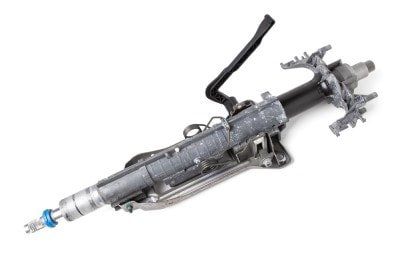
A steering column rarely fails, but if it does, it can be the source of car squeaks when turning right or left, and even when going over bumps.
If the steering column does break down, the most common fix is to have a professional garage repair or replace it. You can often feel a steering column problem through the vibrations on the steering wheel. The noise can be from:
- Cheap plastic housing
- Lack of grease in the steering column clutch
- Section of the steering column rubbing against the dust cover
If the steering column has developed a curve, instead of being straight, the squeal and the vibrations could be the friction between components. In this case, the severity of the noise would show how critical the steering column damage may be.
6. Suspension and Chassis Noises
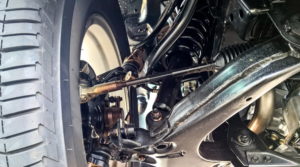
If your car squeaks when turning and going over bumps, it could be a problem with the front suspension parts and chassis. A squeaky suspension can be annoying, but often it will not be a source of danger while driving. Make sure you check the control arms as well.
Older cars lose their lubrication, which will cause a squeak when driving on rough roads. A common fix is to have a mechanic lubricate:
- ball joints
- tie-rod ends
- u-joints
Worn tie rods can also cause clunking sounds when you turn the wheel. Front suspension issues will usually cause steering wheel shakes.
When taking your car in for a regular oil change or tune-up, don't neglect to have the mechanical joints lubricated. This can prevent squeaking noises as the car ages.
7. Loose Interior and Exterior Trim
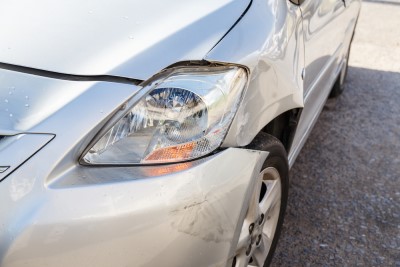
If the car squeaks when turning and braking, it could merely be loose interior and exterior trim that is rubbing on another part. Interior or exterior trim squeaks and rattles can be hushed once you locate the source of the sound – and that can be challenging. Try to find interior noises and eliminate the noise by pressing down on side panels, doors, windows, handles and trim until the sound changes.
For exterior trim that is loose, removing the trim or using a powerful adhesive should eliminate the squeaking noise.
Pro Tip
If you have a plastic panel that's loose, it could be because the "Christmas tree" pins got brittle and fell out. You can replace them easily with a kit like this:
8. Bad Ball Joints
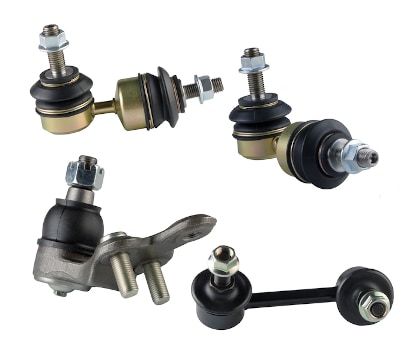
One way to tell if you have bad ball joints is when a squeaking noise or a clunking metal noise if coming from the car's wheels. Ball joints should be lubricated to keep them moving quietly and smoothly. Ball joints connect your car's wheels to the car's suspension and steering system. A weak ball joint is not only noisy, but the severity of this noise can indicate a dangerous driving condition.
If your car is making squealing noises while pulling to the left or right, your ball joints should be inspected and repaired. On older model cars, the ball joints are accessible for repair and lubrication. In newer cars, they may need to be replaced before your suspension system fails and you lose the ability to steer.
How Dangerous is a Squeak When Turning?
If your car squeaks when turning due to a bad CV joint or ball joint, it should be repaired as soon as possible. Otherwise, you can lose control while driving on the road. The same is true for a steering wheel or steering wheel belt problems. You may have trouble turning the steering wheel, which can cause an unpredictable situation.
Suspension and chassis noises may be an indication of metal parts touching each other. If the sound starts to get louder, it is possible you are about to break a strut, a bushing, or you need new shocks. If the squeaking noise is due to loose interior or exterior trim, fixing the problem will restore a quiet drive.
Car Makes a Screeching Noise When Turning on
Source: https://scanneranswers.com/car-squeaks-when-turning/
0 Response to "Car Makes a Screeching Noise When Turning on"
Post a Comment